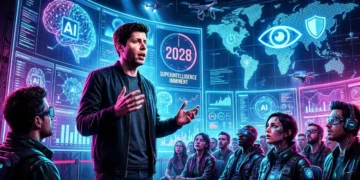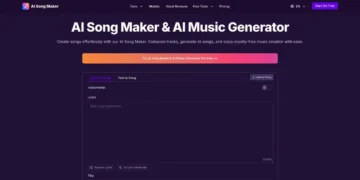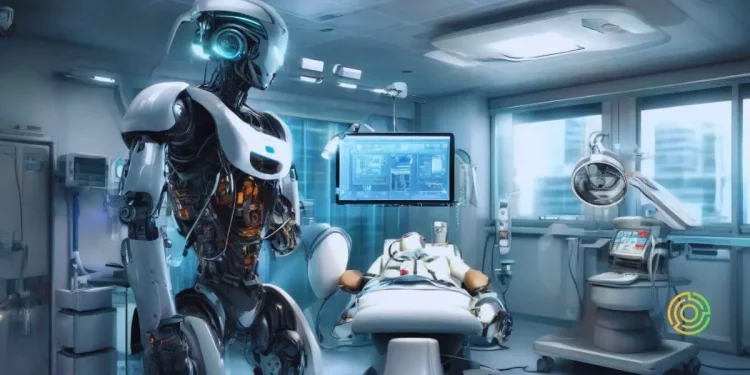AI is driving a paradigm shift across the healthcare sector, unlocking transformative improvements in patient care, diagnostics, treatment plans, and medical insights. As AI capabilities grow more powerful and precise, its integration throughout the healthcare ecosystem promises to accelerate breakthroughs while making personalized, proactive medicine a reality.
Automating Administrative Processes for Streamlined Operations
Healthcare providers face immense paperwork and administrative burdens that contribute to cluttered workflows. Applying AI to automate routine administrative tasks alleviates this burden for clinicians.
Natural language processing tools can transcribe patient visits and medical charts to create digital health records, while voice recognition streamlines documentation. Chatbots also provide an automated first line for patient queries to reduce repetitive information requests handled by nurses and doctors.
By taking over time-consuming clerical tasks, AI lets clinicians focus more time on delivering quality patient care. It also makes operations leaner through increased efficiency.
Revolutionizing Medical Imaging with Enhanced Diagnosis
Analyzing complex medical scans and imagining currently depends heavily on specialized technicians and radiologists. AI imaging analysis elevates this process to new levels.
Deep learning algorithms can be trained to detect abnormalities and diagnose conditions from MRI, CT scans, x-rays, and other medical images. In some cases, AI matches or exceeds human accuracy thanks to pattern recognition capabilities from processing huge datasets.
For clinicians, AI acts as a diagnostic decision support tool, providing fast, accurate scan analysis to complement human expertise. This makes diagnosis faster, especially for common conditions, freeing doctors to tackle more complex cases.
Accelerating New Treatment Discovery with Big Data
Sifting through vast biomedical datasets to determine new treatments and therapeutic targets is incredibly difficult for human researchers alone. AI substantially expedites and enhances this research.
By scanning massive libraries of molecules and compounds, machine learning models can predict interactions and therapeutic potential rapidly. This allows synthesized drugs to be screened for desired qualities faster.
Processing research publications at scale also allows AI to infer connections and new directions researchers may have missed. Large-scale data analysis will likely help unlock transformative new medicines and therapies.
https://www.youtube.com/watch?v=BAA1jGlS7VA
Monitoring Patients Remotely Through Wearables and Sensors
Wearable devices allow doctors to continuously gather patient vitals and biomarkers remotely. Combining this data stream with AI analytics enables real-time monitoring.
Smart algorithms track key health indicators and can detect early warning signs of complications to alert physicians. Remote patient monitoring via wearables paired with AI provides care that was previously only possible in hospitals.
Such close care supports proactive interventions before emergencies occur. These innovations stand to make healthcare preventative instead of reactive.
Personalizing Medicine Through Genetic and Lifestyle Data
AI applied to genetic, microbiome, and lifestyle data helps doctors tailor prevention and treatment plans around a patient’s unique risks. This ushers in an era of precision, personalized medicine.
By correlating health outcomes with biomarkers and behavior patterns, AI models can forecast responses to therapies based on a patient’s traits. AI-generated treatment recommendations enhance outcomes.
Medical guidance can also be adapted dynamically based on continuous patient monitoring. As healthcare becomes proactive, treatment continuously optimizes through AI support to keep people healthier.
Conclusion
The integration of transformative AI technologies throughout the healthcare ecosystem has only just begun, yet its impacts are already improving patient outcomes and speeding discoveries. As algorithms grow more sophisticated, AI promises to massively expand medical capabilities and make proactive, personalized medicine a practical reality.
While challenges exist around user trust and transparency, responsible AI development can address these concerns through governance and ethics. Overall, AI innovation offers tremendous hope for revolutionizing how society cares for human health and wellbeing at scale.
Frequently Asked Questions
How is AI improving medical diagnostics and imaging?
Algorithms analyze complex scans and images to identify abnormalities, often matching or surpassing human accuracy. This assists clinicians in making faster, more accurate diagnoses.
What administrative tasks can healthcare AI automate?
Transcribing notes, filling forms, scheduling, coding/billing, communication, and writing patient reports can be handled by AI systems to reduce clinician workload.
How does AI enable remote patient monitoring?
Wearables gather real-time patient data like vitals. AI analyzes this to detect early complications and alert doctors to intervene proactively.
Can AI help discover new treatments and medicines?
Yes, AI can rapidly screen massive molecular and biomedical datasets to predict therapeutic potential and interactions that may lead to new drugs.
How does AI enable personalized medicine tailored to individuals?
Analyzing genetic, microbiome, and lifestyle data allows AI to forecast responses to therapies and tailor care based on a patient’s unique risks.
What are some risks related to increasing use of AI in healthcare?
Biased data, lack of transparency, misuse of patient data, and over-reliance on AI are key concerns to address through governance as adoption spreads.
How might AI transform healthcare administration?
Automating clerical tasks like billing, appointments, and record-keeping reduces clinician workload. Chatbots also provide an automated first line for patient queries.
How is AI being used in medical diagnostics?
- AI can analyze medical scans like X-rays, CTs, and MRIs to detect abnormalities and assist in diagnosis. Deep learning algorithms match or even exceed human accuracy in identifying diseases in these images.
- Natural language processing helps AI extract key information from medical journals, doctor’s notes, and other text to identify trends and correlations that improve diagnostics.
- Wearable sensor data combined with AI can continuously monitor patients and detect early warning signs of complications, allowing earlier interventions.
How is AI transforming healthcare?
- AI is automating administrative tasks like medical billing, scheduling, and record-keeping to free up more time for human caregiving.
- Chatbots and virtual assistants provide an initial automated interaction point for patients to improve access and efficiency.
- AI can accelerate new drug development by screening huge databases of molecular compounds to predict therapeutic potential.
- Personalized, predictive medicine is emerging powered by AI insights from genetics, lifestyles, and continuous patient monitoring data.
How is AI enhancing patient healthcare?
- Precision diagnostics from AI analysis of medical scans and tests allows earlier disease detection and more targeted treatment.
- AI empowers proactive interventions based on early warning signs rather than reactive treatment after emergencies occur.
- Patients receive care personalized to their unique biology and risks with AI guidance based on their specific data.
- Continuous care is enabled by AI monitoring through wearables and sensors that track patient vitals remotely.
How is AI changing medical imaging?
- Algorithms can automate analysis of complex images like X-rays, MRIs, and CT scans to detect abnormalities and diagnose conditions.
- This allows radiologists and other specialists to interpret images more quickly and accurately with AI assistance.
- Medical imaging data pooled globally can train AI diagnostic models with unprecedented breadth of disease recognition capability.
- For patients, AI enables faster scans with quicker results communication and earlier detection of conditions requiring treatment.
Follow us on our social networks and keep up to date with everything that happens in the Metaverse!
Twitter Linkedin Facebook Telegram Instagram Google News Amazon Store






































